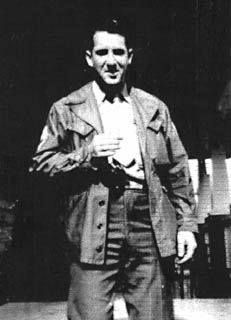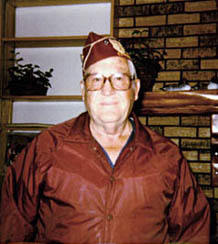
Established April 14, 1942
 |
American Ex-Prisoners of War
A not-for-profit, Congressionally-chartered veterans’ service organization advocating for former prisoners of war and their families.
Established April 14, 1942 |


John Clark, T/Sgt. In 1945
|

John R. Clark 1999
|
|
| Last Name | First Name, Middle Init. | Nickname |
| Spouse | City | State, Zip |
| Conflict — Theatre | Branch of Service | Unit: |
| Military Job | Date Captured | Where Captured |
| Age at Capture | Time Interned | Camps |
| Date Liberated | Medals Received | |
| After the War ... | ||
Clark and his fellow prisoners had been forced marched 600 miles since February, staying one step ahead of the advancing Russian Army. The prisoners marched as much as 32 kilometers a day with little or no food. Hungry prisoners who stole an egg or a potato from a German farm risked being shot. Clark saw prisoners executed this way. Others who had lost the strength to go on were also shot when they staggered out of the formation.
Clark had been in perfect health and weighted 198 pounds when he was captured. By the time he reached an American hospital three days after his rescue, Clark, who is 5 feet, 11 inches tall, weighted only 127 pounds. In addition to his malnutrition, Clark was also facing another threat to his life. The month before, Russian POWs had stolen one of his boots. His best friend, Bill Furay, had the opposite boot stolen. Since Clark wore size 9-1/2 and Furay wore size 9, Clark gave Furay his other boot. Clark marched for days without shoes. He finally got a pair of old galoshes and stuffed them with rags. Worse was to come. After marching for several days in the galoshes, the Germans gave him a pair of new shoes. He had to break them in by marching 25 kilometers that day and 27 kilometers each of the next two days. "My feet were solid blisters," Clark remembers.
Each day the agony of his starvation diet and his mangled feet only seemed to get worse. He shared his agony with Furay, not only his best friend but also a buddy he had been with since basic training. They had remained in the same unit for their entire service, and had even been captured together. The two had marched side by side from France to the prison camps and now were together on this forced march. "The day before I was liberated I told Bill that I just did not think I could make it another day." He knew the Germans would shoot him if he did not keep up. That is why that American flag looked so wonderful to the haggard prisoner and why Friday the 13th will always be special to him. He remembers that shortly after the rescue, he stooped over and blacked out from his hunger and pain. If he had done that while still with the German guards it would have meant certain death.
Clark's hardship had begun when he was captured during the Battle of the Bulge. He was a squad leader in the 106th Infantry Division. It was a new division, thrown together from replacement and green troops during the past few months. The unit had only been able to train together for a month in England before being committed to the front lines. The Germans knew the 106th was green, and, naturally, it was a prime target in Hitler's desperate last gamble to reverse the tide of war. The Germans attacked at 5:30 a.m. on Dec. 16. Clark's unit got the word to fall back. His platoon was the lead element. As they were retreating, German artillery caught them in the open. His platoon was able to keep going while the rest were pinned down. They were soon captured. It was part of the greatest mass surrender in American history.
Clark was not yet one of them. He struggled on with fragments of the shattered division until they reached the middle of the storm; Hill 576. A perimeter was established. More men kept coming until they were 500 strong. They would come to be known as "The Lost 500." But 500 men could not hold out for long against the massive German offensive. Clark and the other men were told to destroy their weapons and surrender on December 21. As their German captors marched them away, Clark said he saw more Tiger tanks lined up against them then he had ever seen. There was no way the 500 could have survived against such firepower. At the time, Clark said the men felt they had made the right decision to surrender. "If we had known what was in the future, we would have stayed and fought to the death."
Clark's ordeal began with a three-day march from St. Vith, Belgium to Prum, Germany. They were given no food during the march. Finally, they reached a railhead, where they were loaded onto box cars, headed for POW camps. They had only been on the train for a part of the day before it had to stop because the American Air Force had bombed the trestles. The boxcars were moved to a siding. Later, an American P-51 shot up the train killing six and wounding 47. The soldier sitting on Clark's left and the one sitting on his right were both killed. Clark said the prisoners then broke the doors down and laid in the snow linking their bodies together to form the words "USPW." The plane came back and rolled its wing (in salute). This was the day before Christmas. We spent the night back in the rail cars. On Christmas, we got a half-loaf of bread and a spoon of jam. This was for two days."
After marching for three days they were put on another train. Again, they were bombed by their own planes but finally reached the prison camps. During in processing, a German officer took all of Clark's possessions, handing him a receipt for the few dollars and francs he carried. Clark managed to hide two things from the officer, which would become crucial to him as times got tougher. Inside the pocket of his field jacket, Clark hid a tiny note paid he had picked up at an USO canteen. He used this note pad to keep a diary of his captivity and record his thoughts during his ordeal. He also managed to hide a small New Testament.
With the Russians advancing from the east, the Germans began to move their POWs westward. Clark's camp was evacuated on Feb. 14. At the end of each day's march, Clark and his fellow prisoners might expect a cup of "grass" soup and some bread. Clark and the other prisoners sometimes managed to steal an egg or some potatoes from a German farm. If they were caught they would be shot, and some were. Each night, Clark recorded how far they marched that day and the name of the town where they stopped. Clark was able to record the distances by remembering the mileage on the road signs. Clark also recorded occasional comments. On March 3, he wrote, "Lined up to be shot because one of our group stole a chicken. They shot 3 prisoners the night before for stealing from a garden."
On March 21, he wrote "Got out of line for water -- dog turned loose on us." Other than these short notes, Clark's focus on the world got narrower and narrower. Finally, all that was on his mind was survival and food. "I blocked stuff out of my mind. When I was liberated the only thing I thought of was food and I thought about Christ and dying," Clark remembered. "I could not get the thought of food out of my mind."
His diary is filled with page after page devoted to fantasies about food. There are pages on exotic recipes, undoubtedly gathered from his fellow prisoners from all parts of the country. New England recipes, country recipes, seafood recipes. One page is devoted to a lavish meal he planned to eat when he was liberated. It was filled with meats, vegetables, fruits, desserts, breads and salads.
Finally, on April 12, he wrote, "Germans told us President Roosevelt died--first true thing they told us." The next day he made another brief note: "Freedom at 10 a.m. Freedom meant many things to Clark, but one it certainly meant was food. He stuffed himself on five or six meals a day during his first weeks of freedom. Unfortunately he was not able to gain weight because of a severe case of dysentery. The medical stations served the former POWs Paregoric by the bottle. Clark took doses as often as he could. Finally, his feet and his body began to heal as he loaded onto a ship for a trip across the Atlantic and home.
Ironically, his mother did not learn he had been captured until after he was freed. The first notice she received was a telegram from the War Department on April 18th that Clark was a prisoner. She had received an earlier telegram on Jan. 12 informing her that he had been missing in action since Dec. 16. Finally, on May 10, Mrs. Clark got the good news that her son had been liberated. Four days later she received another telegram. It said, "Back in States feeling fine furlough soon-LOVE S/SGT John R. Clark."
Clark does not remember sending the last telegram. He thinks it may have been sent by the Army in his name. What he does clearly remember is a telephone call he made to his mother once he got back to the states. When they answered the phone, they mistook him for his brother. He learned that his brother had been severely wounded in the Pacific and was now in a hospital near him. Clark had a reunion with his brother in the hospital. His brother never completely recovered from the wounds and lost an eye. He passed away a few years ago.
Sadly, Clark was never reunited with his old friend Bill Furay. He tried to look him up when he was in Colorado but learned he had died a few years before. For over 30 years Clark kept his memories to himself. He felt he had no one to talk to. Who in Carter County could understand what he had gone through? He simply blocked out his memories and tried to live like everyone else. Then in 1976, a group of local ex-POWs came together to share their memories. For the first time, Clark had a chance to talk to others who could understand what he was saying. It took a long time to open up.
"I could not sit here and talk about it before I joined that group. I didn't need sympathy and I didn't need pity, and chances are no one would believe half the stuff we went through." Nowadays, Clark shares his memories and experiences with those who are interested. He frequently talks to schoolchildren about what it would be like to lose their freedom. He hopes they come away with a renewed appreciation of their freedom. He also remembers how important his old tattered New Testament was to him in his captivity. That memory has led him to an active career in the Gideons. He hopes that someone else in pain may have the same comfort he had.
Unlike most Americans, Clark's memories mean that he has never taken for granted his freedom or his faith in God.